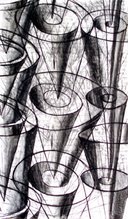By Lun-Yi Tsai in response to Ralph Lichtensteiger
[This is something I wrote a couple years ago, which is a little different from how I would write it today, but I think it still captures the essence of what silence is.]
As a child I remember the silence of night and the ringing of my ears. But it wasn’t complete silence if I listened carefully there was the occasional cracking of the wooden floorboards and then the sounds of car wheels on the streets below. And if it was a rainy night, the silence was filled with wet splattering, splashing, and swishing.
Is silence simply the lack of sound? Or does silence exist insofar as there is sound? Just as the notion of absolute space makes no sense today, perhaps absolute silence is also an illusion, a construct of our minds. The most silent moment of our lives have been filled with that incessant ringing, which we usually fail to notice as we are enveloped in sounds. How then is it that silence is such a mundane everyday notion? It seems to me when people talk about silence, they mean relative silence. For most people, there is some more or less approximate and acceptable threshold below which sounds are quiet and hence amount to silence. It is a strange arithmetic.
But this is not the silence I am interested in—such silence does not give peace. The silence that I seek is that which exists no matter how loud our environment. The words we use are blunt tools. They are born of the illusion of time and space. Implicit within them are these sad notions; the verbs have tenses, they express the movement in time. We learn at an early age to use these words and in doing so we are trapped in the prison of time, space and change. So powerful are these conceptions that simply questioning them brings up very strong reactions even among our most thoughtful companions. This attachment to an illusory inheritance without silence holds within it the seeds of our infinite sorrow. The busy hum of life struggling incessantly permeates us whether it is the mundane buzz of day-to-day work, or the crude violence of war and the hum of its machinery, or the subtle clash of intellectual minds pummeling one another, or the intense creative act that strains ones powers to the limit on complex patterns and equally profound relations among them. But if one listens carefully in what seems to be silence, one hears again that ringing from childhood—it is the silent ringing of misery.
It is paradoxical that the artist is one who is poised on the cusp of silence and non-silence. She is the one who is closest and yet furthest from silence. In painting, I have experienced instants of silence when "I" ceases and there is only the awareness of being and movement. But these have been punctuations in an otherwise willful, purposeful, intentional action—that of "creating" art. Art is the record of the past and the passing present, which includes the past present and the future present. It seeks to capture a moment or a period of time, a sentiment, an emotion, a panorama, or any number of past things combined. We are trapped in the act of making physical objects; all art is the genesis of objects be they images on paper or canvas or sculpture or words and markings on paper or magnetic or electronic records. They are delivered as aggregate complexes of sign-sensations predominantly visual, tactile, motor and auditory filling the mind with associative thoughts and emotions from individual memories. No, the artist and her work are not a movement towards silence. If silence is the highest possible attainment, then I fear that it is perhaps easier for a camel to pass through the eye of a needle than for an artist to attain silence.
The question lingers. Can there be creation that is silent, without attachment? If silence is beyond the physical, perhaps it is the truly authentic creative act—creation that is unconscious, without intention, without yearning for recognition or fame. It is the creation that is unaware that it is creating; for true awareness is the re-creation of being from moment to moment. Silence is the aesthetic awareness of being—not the attachment to images of the past or the future, but the radical movement beyond time.
— Lun-Yi Tsai, Seattle, April 11, 2005© 2005 by Lun-Yi Tsai

No comments:
Post a Comment